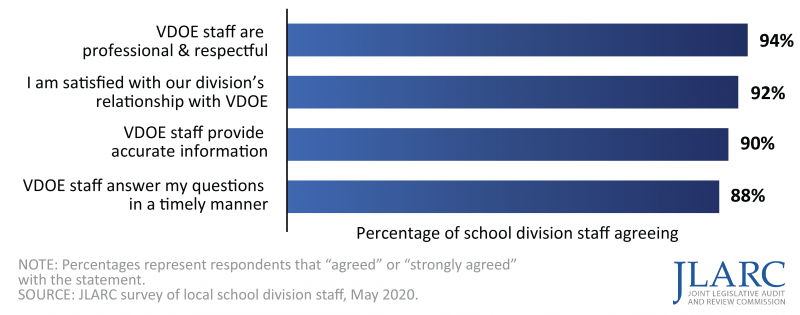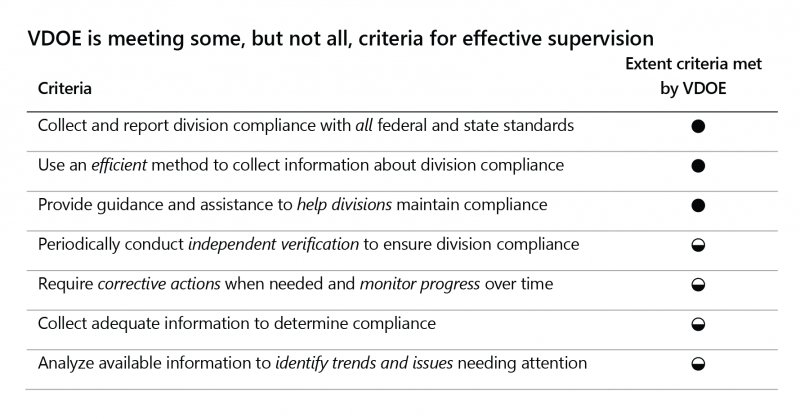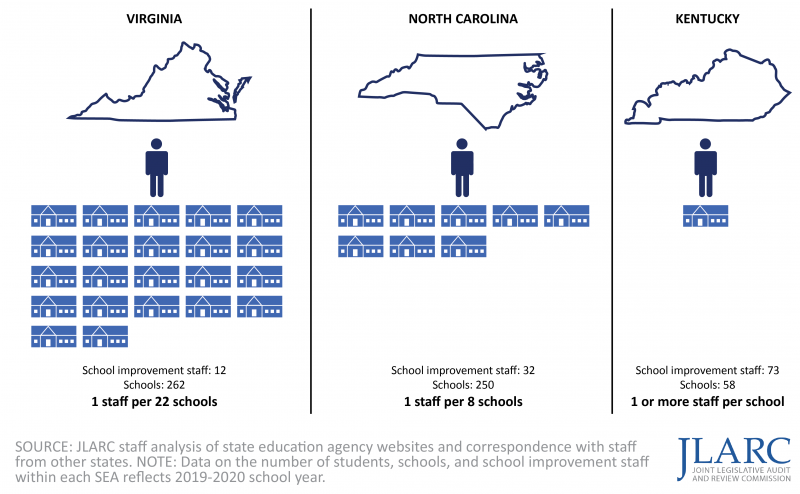Operations and Performance of VDOE

WHY WE DID THIS STUDY
JLARC approved a resolution in 2018 directing staff to review the Virginia Department of Education (VDOE) because (i) it is a large state agency that plays a critical role in educating Virginia’s children and (ii) it had not been reviewed by JLARC in many years.
ABOUT
VDOE, through the Virginia Board of Education, has the broad statutory direction to provide “general supervision of the public school system” and to conduct “proper and uniform enforcement of the provisions of the school laws in cooperation with the local school authorities.” VDOE has about 350 employees who are located in the agency’s office in downtown Richmond.
WHAT WE FOUND
School divisions generally view VDOE positively and note recent improvements
School divisions and education stakeholder groups generally praised VDOE staff. Nearly all school divisions view VDOE staff as professional and report they are satisfied with their division’s relationship with VDOE, according to a survey of school divisions. Most divisions also agreed that VDOE staff provide them accurate information and do so in a timely manner.
Moreover, two-thirds of school division staff indicated their division’s relationship with VDOE somewhat or substantially improved over the past three years.

VDOE could do more to effectively supervise local divisions
VDOE is fully meeting some, but not all, criteria for effective supervision of local school divisions (table). VDOE efficiently collects and reports compliance information and data from school divisions for 41 federal and state requirements. School divisions also rate VDOE’s guidance and assistance for reporting compliance with state standards highly.
However, the longstanding approach VDOE uses to supervise school divisions has limitations. VDOE primarily supervises divisions by asking them to self-certify whether they are complying with state standards. The agency independently verifies compliance for some, but not all, standards and monitors implementation of corrective actions for federal standards but does not always do so for state standards. In addition, information collected from school divisions is not always adequate to determine compliance.

Given the substantial amount of funding the state provides to the public education system, the extensive standards schools must comply with, and the importance of providing a quality education to each child, consideration should be given to strengthening VDOE’s supervision of school divisions. More comprehensive and effective state supervision for a subset of key standards could help to ensure that all school divisions meet their educational responsibilities.
VDOE generally provides adequate support and assistance
The vast majority of school divisions are satisfied with the overall support and technical assistance provided by VDOE, according to the survey of division staff. Almost every division responding to the survey agreed that VDOE provides support that aligns with their instructional and non-instructional needs. Divisions also generally agreed that VDOE provided effective technical assistance and support in several key instructional and school operational areas.
School division staff indicated VDOE’s support of virtual learning and instructional technology was less effective, but VDOE has substantially increased resources to support virtual instruction. This summer, in response to increased demand for virtual learning resources during the COVID-19 pandemic, VDOE added substantial new content to Virtual Virginia (the state’s online learning management system) and expanded course offerings from mostly high school to also include middle and elementary school courses.
School improvement program needs to be strengthened to better support low-performing schools and divisions
Only half of school divisions that had worked with VDOE’s Office of School Quality (OSQ) indicated that the office had effectively helped them improve their performance through the school improvement program. Both OSQ staff and participating school division staff cited frustrations with the program that was described as largely a compliance exercise. OSQ is in the process of developing and implementing a new model using customized mentoring and coaching for school leadership that it hopes will improve the assistance provided to low-performing schools.
Along with a new approach, additional resources are needed to effectively implement the program. Virginia currently devotes comparatively few staff (12), to the state’s school improvement function. Last year, OSQ worked with more than 260 schools resulting in a ratio of 22 schools per one OSQ staff. At current staffing levels, each staff member has about two weeks per year to work with each school needing improvement. Virginia devotes substantially fewer state staff to school improvement than several neighboring states. Virginia’s school-to-staff ratio is much higher than the ratios in North Carolina and Kentucky (figure).
VDOE’s Office of School Quality has more schools in need of improvement per staff than comparable offices in neighboring states

Given the critical importance of the state’s work to help improve low-performing schools and the lack of priority given to it in the past, the Code of Virginia should be amended to direct the state to administer an effective school improvement program. Providing explicit direction in the Code of Virginia would help ensure a sustained, long-term focus on improving low-performing schools that endures leadership changes at VDOE.
Office of Teacher Education should be strengthened to better support school divisions
No single entity in Virginia is responsible for ensuring the state has enough fully licensed teachers, but VDOE plays a role through its Department of Teacher Education and Licensure. However, only half of school divisions reported that VDOE’s support in recruiting and retaining highly qualified teachers was effective. The Office of Teacher Education needs to strengthen its support of local school divisions through more useful data collection and analysis to identify teacher shortages, target allocation of funds, and evaluate teacher mentorship programs. The office could also be given an expanded role helping divisions—especially those with staffing challenges—better recruit and retain teachers.
WHAT WE RECOMMEND
Legislative action
- Direct the creation of a pilot program to more comprehensively supervise school division compliance with a subset of key state standards.
- Amend the Code of Virginia to require the development, implementation, and evaluation of effective state school improvement services.
- Provide additional funds for more staffing to provide school improvement services in the Office of School Quality.
Executive action
- Develop and implement a plan to effectively transition to the new school improvement model.
- More effectively implement existing responsiblities related to teacher recuirtment and retention.
Policy options for consideration
Legislative action
- Provide additional funds for new staff to design and implement a pilot program to more comprehensively supervise school division compliance with a subset of key state standards.
- Provide additional funds for more staffing in the Office of Teacher Education.
Executive action
- Expand the support the Office of Teacher Education provides to divisions experiencing challenges recruiting and retaining teachers.
The complete list of recommendations and options is available here.

